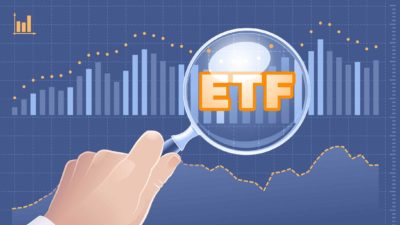The ASX exchange-traded funds (ETFs) I'm going to talk about in this article could perform much better than the S&P/ASX 200 Index (ASX: XJO), in my opinion.
Investing in a share that gives exposure to the ASX 200 (or S&P/ASX 300 Index (ASX: XKO) ) isn't a bad option. However, I think that there are better opportunities out there for Aussies to choose from.
Much of ASX 200 is weighted to two sectors, with just a few large businesses having most of that weighting: BHP Group Ltd (ASX: BHP), Commonwealth Bank of Australia (ASX: CBA), National Australia Bank Ltd (ASX: NAB), Westpac Banking Corp (ASX: WBC), and ANZ Group Holdings Ltd (ASX: ANZ).
These are such large businesses that I think it will be hard for them to achieve a strong compound annual growth rate (CAGR) for profit over the next three to five years. There may be decent dividends, but I don't think there will be a lot of capital growth or earnings growth.
I believe the businesses within the two ASX ETFs I'm about to tell you about could deliver much more growth over time.
iShares Global 100 ETF (ASX: IOO)
The idea of this ETF is that it's invested in the 100 largest businesses in the world, whether they're listed in a 'developed' or 'emerging' market.
With how capitalism works, the strongest businesses tend to keep getting stronger and stronger as they re-invest in their businesses to reinforce their competitive advantages.
I'd rate global blue chip shares as much stronger businesses than ASX blue chip shares. In the iShares Global 100 ETF portfolio, the biggest businesses are names like Apple, Microsoft, Amazon.com, Nvidia, Alphabet, and JPMorgan Chase.
Around 75% of the portfolio is invested in US shares, but there is also global diversification with a few other countries having sizeable weightings, including the UK, Switzerland, France, Germany, Japan, and South Korea.
Although past performance is not a guarantee of future results, the IOO ETF has delivered an average return per annum of 14.8% over the five years to 30 June 2023. That compares to the average return per annum of 7.2% for the ASX 200.
Betashares Global Quality Leaders ETF (ASX: QLTY)
This ASX ETF is about investing in global businesses that rank well on 'quality' measures. There are many different ways to measure quality but for this fund, there are four factors: return on equity (ROE), debt to capital, cash flow generation ability, and earnings stability.
The combination of those factors means the businesses are making good and stable profits and cash flow in terms of how much shareholder money is invested within the businesses, and their balance sheets are healthy.
This portfolio also has good diversification with 150 global companies outside of Australia.
There isn't that much difference in the weighting levels of most of the investments, but Adobe, Meta Platforms, Tesla, Automatic Data Processing, and Visa are the ones with an allocation of just over 2%.
ASX 200 large-cap shares just don't have the level of quality and growth that these global names do, in my opinion.
The ASX ETF's management fee of 0.35% is fairly cheap considering the amount of thought that has gone into constructing this global portfolio.
Since its inception in November 2018, the QLTY ETF has produced an average return per annum of 13.7%, though past performance is not a reliable indicator of future performance.









